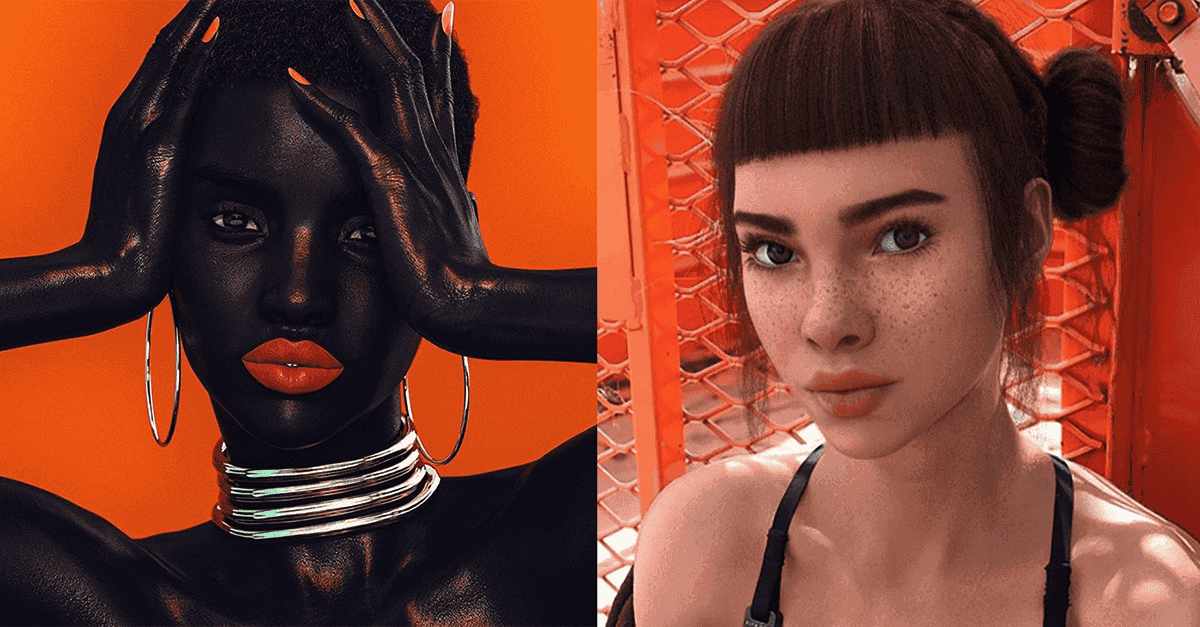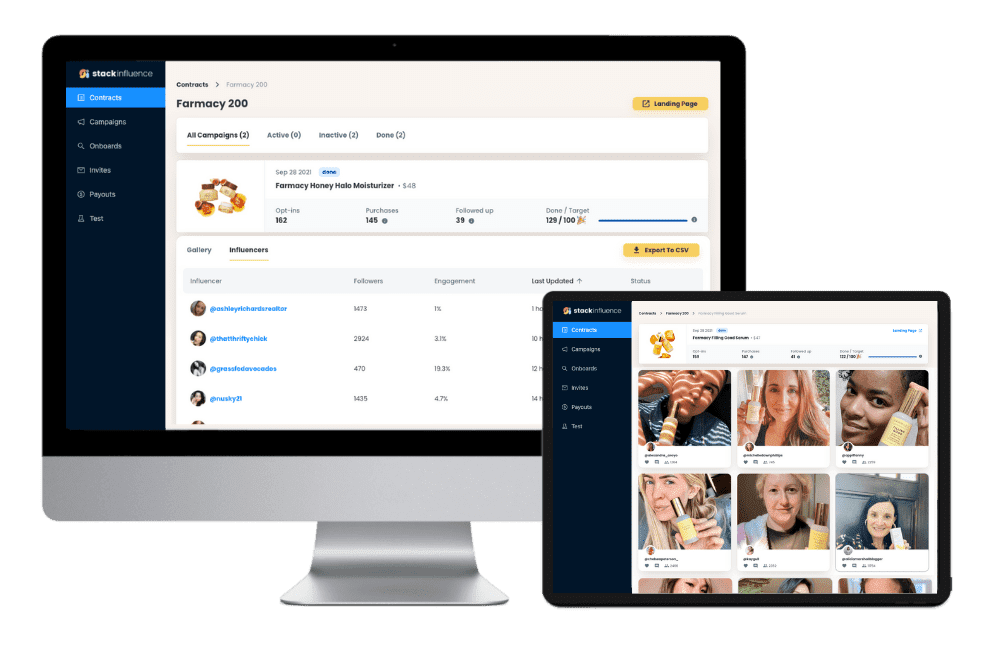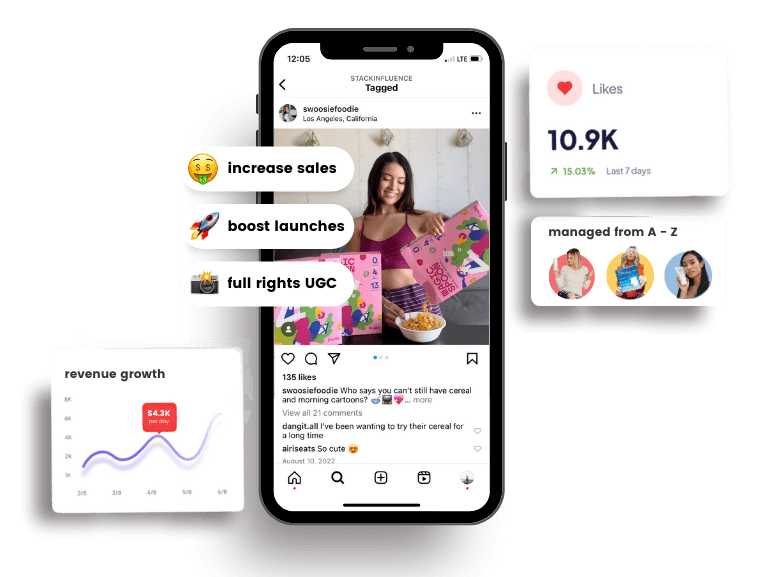The Emergence of AI Influencers
29th
August, 2024
Amazon Influencers
Influencer Marketing
Amazon Marketplace

In recent years, a new phenomenon has taken the world of social media and marketing by storm – the emergence of AI influencers. These digital personalities, powered by artificial intelligence and lifelike animation, have redefined the concept of influencer marketing and raised intriguing questions about the future of online communication.
The rise of AI influencers can be attributed to several factors, including advancements in technology and the increasing capabilities of AI to create eerily realistic digital personas. According to MarketsandMarkets, the global artificial intelligence market is projected to reach a value of $407 billion by the end of 2027, with AI applications ranging from customer service chatbots to virtual influencers.
As more brands and marketing agencies turn to AI influencers to promote products and services, the landscape of influencer marketing undergoes a significant shift. Traditional human influencers, while still essential, now share the limelight with their AI counterparts. This has sparked discussions about the impact of AI influencers on consumer behavior and the authenticity of online interactions.
From a diverse perspective, some experts laud the potential of AI influencers to provide a consistent brand image and engage with audiences on a 24/7 basis. On the other hand, concerns have been raised about the ethical implications of creating AI personas that can blur the line between reality and fiction.
As we delve deeper into the world of AI influencers, it becomes evident that the topic is rich with implications for marketing, social interactions, and the evolving role of technology in our lives.
What are AI Influencers?

Source: Internet Matters
In essence, AI influencers are virtual personalities that exist solely in digital spaces. These digital personas are created via advanced computer technology that employs artificial intelligence algorithms and lifelike animations to simulate human-like behavior and movements.
AI influencers can be used in marketing campaigns, just like traditional human influencers, to promote products, services, and brands. They interact with audiences through social media channels and other digital platforms, posting content such as photos, videos, and messages.
One of the fascinating aspects of AI influencers is their ability to stay online round the clock, engaging with their followers and responding to messages without being fatigued by the demands of social media. This makes AI influencers an attractive option for companies looking to maintain an active online presence, build relationships with customers and drive sales through engagement.
While AI influencers are still a relatively new phenomenon, their impact on the consumer landscape cannot be ignored. According to Charle.co.uk 78% of marketers believe that influencer marketing is an effective way to reach a target audience. With AI influencers, brands can appeal to a broader audience and gain a competitive edge in the digital space.
However, from a diverse perspective, there is a debate over the authenticity of connections made with AI influencers, as they are solely digital and lack human touch. Another criticism of AI influencers is the potential negative impact on the career prospects of human influencers who could be replaced by AI alternatives.
In conclusion, AI influencers are a new phenomenon that is rapidly transforming the influencer marketing landscape. They bring with them a plethora of exciting opportunities as well as ethical, social, and technological implications that need to be carefully considered.
The Rise of AI Influencers
The emergence of AI influencers can be traced back to the advancements in computer technology and artificial intelligence. With the development of sophisticated algorithms and machine-learning models, it has become possible to create digital personas that simulate human speech, movement, and interaction.
One of the notable AI influencers is Lil Miquela, created by AI startup Brud. Lil Miquela’s Instagram account has over 2.5 million followers and has collaborated with high-profile fashion and lifestyle brands.
Another popular AI influencer is Bermuda, an avatar created by the company South Korean startup DOT. Though her account is relatively new, Bermuda has more than 220,000 followers on Instagram and growing, with some speculating that she could become the next Lil Miquela.
The popularity of AI influencers is on the rise. In 2021, it was estimated that more than 69.2 million people worldwide follow at least one digital avatar on social media platforms. Additionally, a report by Precedence Research found that the global virtual assistant market size is expected to grow to 178.80 billion by 2034, This suggests that there is a growing demand for AI-generated content and virtual interactions.
From a diverse perspective, the rise of AI influencers has positive and negative implications. On one hand, AI influencers have the potential to create cost-effective and relevant brand collaborations, content creation, and engagement. They can help companies maintain a consistent message and image across different platforms.
On the other hand, some argue that AI influencers are an unethical attempt to fabricate social connections and manipulate consumer behavior – a sort of virtual puppet. Critics also warn that the line between fiction and reality can be easily blurred, which can lead to serious social implications.
In conclusion, the rise of AI influencers is a reflection of technology’s rapid evolution and vast potential in marketing and entertainment. However, their advantages need to be carefully weighed against ethical and social concerns, so that consumers’ interests are not compromised.

Unlock the Power of Micro Influencers and Elevate your Brand Today!

Role of AI Influencers in Marketing
AI influencers have revolutionized the marketing industry by offering new ways to engage with audiences and promote products and services. These digital avatars, powered by artificial intelligence, play a crucial role in shaping consumer behavior and influencing brand perception.
One of the significant advantages of using AI influencers in marketing is their ability to reach a diverse and global audience. Unlike human influencers whose reach may be limited by factors like location and language, AI influencers can connect with users across various demographics and geographies, making them an attractive option for brands with international markets.
AI influencers also offer a level of consistency and reliability that can be challenging to achieve with human influencers. They can work 24/7, always providing a consistent brand message and maintaining a constant online presence. This reliability is particularly beneficial for companies that want to ensure a seamless and continuous engagement with their audience.
Moreover, AI has the potential to revolutionize healthcare by providing personalized treatment plans, improving diagnostics accuracy, driving pharmaceutical research, and even streamlining administrative processes like obtaining a doctors certificate online. Studies have shown that AI-powered tools can analyze medical images with a level of accuracy comparable to that of expert radiologists, potentially saving lives and reducing healthcare costs. Partnering with an AI app development agency can help healthcare organizations design and deploy tailored AI solutions that seamlessly integrate into clinical workflows.
From a diverse perspective, some critics argue that AI influencers lack authenticity and genuine human connections. They raise concerns about the impersonal nature of interactions with digital avatars, suggesting that emotional bonds formed with AI influencers may not be as meaningful as those with real human beings.
On the other hand, proponents of AI influencers highlight their potential to automate marketing processes, reduce costs, and deliver measurable results. They emphasize the scalability and efficiency of AI-generated content, which can be tailored to specific target audiences and analyzed for performance metrics in real-time.
In conclusion, the role of AI influencers in marketing is multifaceted, offering both opportunities and challenges for brands seeking to engage with consumers in the digital age. By balancing technological innovation with human-centered approaches, marketers can leverage the power of AI influencers to create impactful campaigns that resonate with their target audiences.
The Future of AI Influencers
As technology continues to evolve, it’s no surprise that the future of AI influencers is bright. AI-generated content has already shown its potential in capturing the attention of audiences globally, and this is just the beginning.
One of the most optimistic predictions is the potential for AI influencers to leverage their growing value to become major players in various types of content creation, including movies, gaming, and even spaces outside of the entertainment industry. According to Grand View Research, by 2030, the global virtual influencer market is estimated to have a Compound Annual Growth Rate (CAGR) of 38.9%, reaching a market size of $45.82 billion.
Another exciting prospect is AI influencer’s potential to provide new opportunities for minority groups to participate in otherwise exclusive areas. For example, AI can provide an opportunity for disabled creatives to bypass physical limitations and access a diverse audience base from their computers. AI influencer can provide a level playing ground for creatives to express themselves and be celebrated for their work.
However, while there is a significant potential for AI influencers, there are some challenges to consider. One of the biggest concerns is the uncanny valley effect – a phenomenon where humans feel uncomfortable when they encounter digital avatars with an almost-human appearance and behavior. With AI influencers becoming widespread, it’s essential to avoid this phenomenon to ensure that audiences can connect with the characters positively.
Another challenge is the potential misuse of AI-generated content, such as deep fake videos or messages, creating a threat to both privacy and truthfulness. AI influencer network can be a target to compromise the authenticity and lead to severe consequences. Preventing this from happening requires these tools to be used with highly regulated practices that take into account these security concerns.
In conclusion, the future of AI influencers is bright and brings new opportunities both for creators and audiences worldwide. However, the challenges posed by the technology should not be ignored – it’s crucial that creators, advertisers, and regulators navigate these challenges systematically and transparently.
Conclusion on the Emergence of AI Influeners
As we look towards the future, it’s essential to recognize the impact of artificial intelligence (AI) across various aspects of our lives and consider the diverse perspectives that shape these advancements.
The advent of AI has significantly transformed industries, from healthcare to finance, by enhancing efficiency, accuracy, and innovation. According to a report by McKinsey & Company, AI has the potential to create an additional $13 trillion in economic value worldwide by 2030. This immense impact underscores the transformative power of AI in driving economic growth and development.
Moreover, AI has the potential to revolutionize healthcare by providing personalized treatment plans, improving diagnostics accuracy, and driving pharmaceutical research. Studies have shown that AI-powered tools can analyze medical images with a level of accuracy comparable to that of expert radiologists, potentially saving lives and reducing healthcare costs.
On the other hand, the ethical implications of AI technology must be closely monitored and regulated to prevent biases and ensure fairness. As AI systems become more autonomous, questions arise about accountability, transparency, and privacy. It is imperative for policymakers, researchers, and industry leaders to collaborate and establish ethical frameworks that guide the development and deployment of AI technologies responsibly.
In the realm of education, AI offers innovative solutions to personalize learning experiences and enhance student outcomes. By leveraging AI algorithms to analyze data on student performance, educators can tailor educational content to address individual learning needs effectively.
However, it’s crucial to address concerns surrounding data privacy, security, and the potential for AI to exacerbate existing inequalities in education access. Ensuring that AI technologies are implemented equitably and ethically is essential to harnessing their full potential for educational advancement.
In conclusion, the future of AI is brimming with promise and potential, yet it is imperative to navigate this transformative landscape with caution and consideration for the diverse implications it may have on society. By embracing the opportunities while addressing the challenges, we can cultivate a future where AI enriches lives, empowers communities, and drives progress in a balanced and inclusive manner.
Want new articles before they get published?
Subscribe to our Awesome Newsletter.
Want new articles before they get published? Subscribe to our Awesome Newsletter.
stack up your influence
turning creativity into currency
our headquarters
111 NE 1st St, Miami, FL 33132
our contact info
[email protected]
stack up your influence
turning creativity into currency
our headquarters
111 NE 1st St, 8th Floor
Miami, FL 33132


